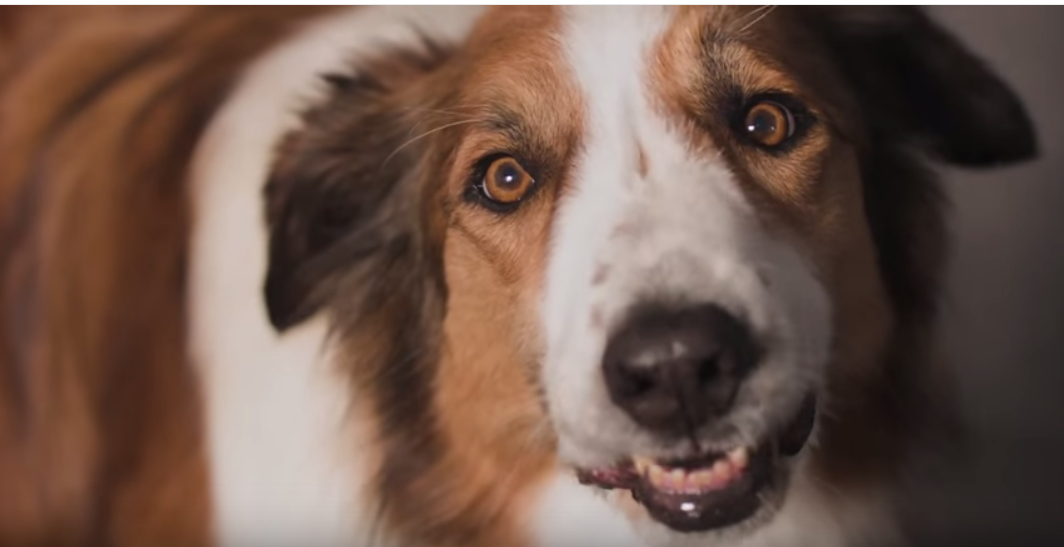Why is it that almost every voice-over for dogs in commercials for flea & tick medication, pet food, or treats is masculine?
First, animals for whom we do not know the sex or gender we often presume to be male by default. Secondly, canines in particular tend to be masculinized. However, the predominance of masculine voices in media is well documented. Human or nonhuman, it really speaks to the patriarchal dominance of public spaces and experiences.1
Feminine voices only seem to be consistently ascribed to Nonhuman Animals on television in dairy commercials featuring farmed cows. These voices are often matronly, as well, likely in an attempt to frame the product as something that is nurturing, healthful, and familial.
One exception can be found in the 2015 Yoplait commercial that gives a masculine French voice to an American female-bodied dairy cow. In fact, cows are frequently represented as male despite being female-bodied.2 This not only demonstrates a general ignorance about the American food system, but it also lends evidence to the male-as-default schema.
Notes:
1. Voice-overs are also white-dominated, with few ethnic intonations represented.
2. Gender and sex are not one in the same of course, but human constructions of gender in the nonhuman world are even less consistent and tend to reflect gender hierarchies.
 Dr. Wrenn is Lecturer of Sociology. She received her Ph.D. in Sociology with Colorado State University in 2016. She received her M.S. in Sociology in 2008 and her B.A. in Political Science in 2005, both from Virginia Tech. She was awarded Exemplary Diversity Scholar, 2016 by the University of Michigan’s National Center for Institutional Diversity. She served as council member with the American Sociological Association’s Animals & Society section (2013-2016) and was elected Chair in 2018. She serves as Book Review Editor to Society & Animals and is a member of the Research Advisory Council of The Vegan Society. She has contributed to the Human-Animal Studies Images and Cinema blogs for the Animals and Society Institute and has been published in several peer-reviewed academic journals including the Journal of Gender Studies, Environmental Values, Feminist Media Studies, Disability & Society, Food, Culture & Society, and Society & Animals. In July 2013, she founded the Vegan Feminist Network, an academic-activist project engaging intersectional social justice praxis. She is the author of A Rational Approach to Animal Rights: Extensions in Abolitionist Theory (Palgrave MacMillan 2016).
Dr. Wrenn is Lecturer of Sociology. She received her Ph.D. in Sociology with Colorado State University in 2016. She received her M.S. in Sociology in 2008 and her B.A. in Political Science in 2005, both from Virginia Tech. She was awarded Exemplary Diversity Scholar, 2016 by the University of Michigan’s National Center for Institutional Diversity. She served as council member with the American Sociological Association’s Animals & Society section (2013-2016) and was elected Chair in 2018. She serves as Book Review Editor to Society & Animals and is a member of the Research Advisory Council of The Vegan Society. She has contributed to the Human-Animal Studies Images and Cinema blogs for the Animals and Society Institute and has been published in several peer-reviewed academic journals including the Journal of Gender Studies, Environmental Values, Feminist Media Studies, Disability & Society, Food, Culture & Society, and Society & Animals. In July 2013, she founded the Vegan Feminist Network, an academic-activist project engaging intersectional social justice praxis. She is the author of A Rational Approach to Animal Rights: Extensions in Abolitionist Theory (Palgrave MacMillan 2016).
Receive research updates straight to your inbox by subscribing to my newsletter.

